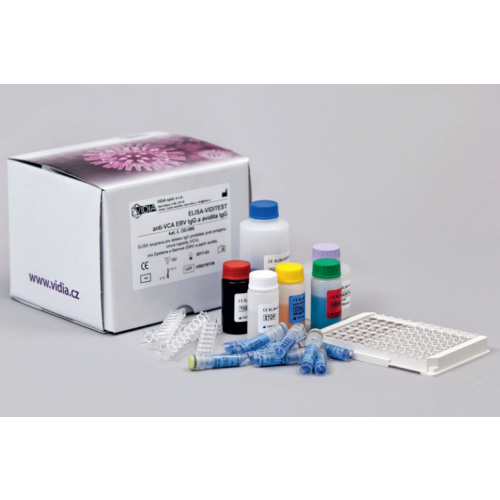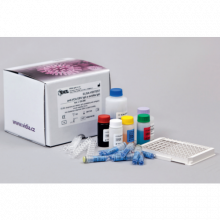
Anti-VCA EBV IgG and IgG avidity ELISA kit, 48 tests
(Cat#: ODZ-175)
Description
The ELISA-VIDITEST anti-VCA EBV IgG and IgG avidity kit is intended for in vitro diagnostic procedures in EBV (Epstein-Barr virus)-induced and EBV-associated diseases, such as infectious mononucleosis and the chronic active EBV infection, and for IgG avidity evaluation. The test can be used in the diagnosis of Burkitt’s lymphoma, nasopharyngeal carcinoma, carcinoma of the Waldeyer’s ring and in characterization of opportunistic lymphomas (oligo- and polyclonal). This kit can also be used in characterization of chronic fatigue syndrome, neuro-infection, and immunosuppression that is frequently associated with EBV-reactivation.
This assay is a solid-phase immune-analytical test. The polystyrene strips are coated with specific antigens that bear immunodominant epitopes of VCA (viral capsid antigen) complex. Each serum sample is applied into two parallel wells and the anti-VCA antibodies present in the samples bind to the immobilized antigens. Next, one well is incubated with a wash buffer and the parallel well is incubated with urea solution. The anti-VCA EBV antibodies, if present in the sample, bind to the immobilized antigens and are later recognized by animal anti-human IgG antibodies labeled with horseradish peroxidase. The labeled antibodies are revealed by an enzymatic reaction with a chromogenic substrate. The presence of the low avidity antibodies is indicated by a drop of absorbance in wells to which urea solution was added. The ratio between the optical density of the wells without urea and the corresponding wells with urea represents the relative avidity index.
- Solid-phase immuno-analytical test for detection of IgG antibodies to VCA of EBV and IgG avidity evaluation
- Used with human serum
- Complete panel of EBV serological markers can be examined in single dilution of serum sample
- Semi quantitative evaluation
- Diagnosis of EBV-induced or EBV-associated diseases
- Characterization of chronic fatigue syndrome, immunodeficiency and neuro infection related to EBV
- IgG avidity evaluation
- ELISA break-away strips coated with specific antigens, 1 microplate
- High avidity control serum, 1.3ml
- Low avidity control serum, 1.3ml
- Negative control serum, 1.3ml
- Anti-Human IgG antibodies labeled with horseradish peroxidase (Px-conjugate), 13ml
- Wash buffer 10x concentrated, 125ml
- Urea solution, 15ml
- Dilution buffer, 100ml
- Chromogenic substrate (TMB substrate), 13ml
- Stop solution, 13ml
Boca Scientific is your premiere source for high-quality, innovative solutions for Cell Biology, Molecular Biology, Immunology, genetics and other lab products and reagents. We bring leading-edge products from our own-line and around the world to laboratories in the US and Canada. Our goal is to offer excellent solutions to drive research and discoveries backed by superior customer support.

